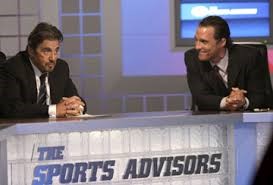 The latest film in our gambling series focusses on the world of sports betting, with the Pacino / McConaughey blockbuster “Two for the Money”. McConaughey is the lead as Brandon Lang, a football player who is forced to take a job at a call centre after a career-ending knee injury. He’s quickly given an assignment of picking the winners for the weekend’s college football games – a task where is profoundly successful. His reliable picks draw the attention of Walter Abrams (Pacino), a reformed problem gambling in New York who runs a sports consulting operation. At the time of the film, sports betting is illegal in the US outside of Nevada, but companies can nevertheless profit by selling advice and taking a share of their clients’ winnings (placed via bookies in Nevada).
The latest film in our gambling series focusses on the world of sports betting, with the Pacino / McConaughey blockbuster “Two for the Money”. McConaughey is the lead as Brandon Lang, a football player who is forced to take a job at a call centre after a career-ending knee injury. He’s quickly given an assignment of picking the winners for the weekend’s college football games – a task where is profoundly successful. His reliable picks draw the attention of Walter Abrams (Pacino), a reformed problem gambling in New York who runs a sports consulting operation. At the time of the film, sports betting is illegal in the US outside of Nevada, but companies can nevertheless profit by selling advice and taking a share of their clients’ winnings (placed via bookies in Nevada).
As a partnership, Lang’s picks and Abrams’ business sense prove a dynamite combination and begin to attract million dollar investments. Lang develops an alter ego “John Anthony” who Abrams turns into a TV star, offering betting advice on his cable channel. But as the stakes get high, Lang’s picks start to fail, and Abrams’ customer base starts to flee and turn violent. This is compounded by the revelation that Abrams himself has been reinvesting the company profits on Lang’s predictions; a behaviour that is portrayed as a relapse of his gambling past. As the scheme unravels, Lang walks away, making his picks for the last game by flipping coins.
As a lab, we were not terribly impressed with this film. The casting and acting are suspect in places, and we were reminded of McConaughey’s dark years before his recent return to form with True Detective and Interstellar. The frenetic script introduces sub-plots all over the place, many of which are never resolved, like Abrams’ heart condition. For entertainment, we gave the film 2.8 out of 5. For portrayal of gambling, the film scored even less well: 1.4 out of 5. Our major problem here was with the nature of sports betting itself; the film is essentially opaque (and even worse, disingenuous) as to whether Lang’s pickings reflect any true ability or a pure lucky streak. In the first 90 minutes of the film, all Lang’s predictions come true, and we are told he has an 80% success rate over 1 year. This is a uncomfortable storyline for the public perceptions of sports betting – many people have first-hand experience of college sports, and in this regard Lang’s background is not that exceptional – should all these people b elieve that they could be expert pickers? A Google search indicates that long-standing (10 years +) sports betting advisors rarely exceed 55% correct predictions.
elieve that they could be expert pickers? A Google search indicates that long-standing (10 years +) sports betting advisors rarely exceed 55% correct predictions.
Perhaps in response to these ethical concerns, the film’s denouement shifts to a completely different stance: that chance is everywhere in life, and one’s luck always changes. This is enacted (with sledgehammer subtlety) by Abrams ‘gambling’ with his marriage to Rene Russo. But the implication that Lang’s initial success was simply a long lucky streak (a ‘hot hand’) seems implausible within the film’s own storyline. The downturn in Lang’s predictions does not happen out of the blue, rather it coincides precisely with his growing arrogance: he starts failing to research his picks, he forces junior colleagues to make picks on his behalf, and submits his picks a week early, thereby ignoring any breaking team news. By implying the Lang had some genuine ability in the earlier part of the film, his collapse is better considered a case of ‘choking’ under pressure.
Despite these criticisms, the film inspired some interesting discussions. A recent Israeli study highlighted the linkage between problematic gambling and competitive, professional sports (Gavriel-Fried et al 2015 American Journal of Addictions). As college athletes develop such high levels of skill in their fields of excellence (as Lang did as a college footballer), they may be at elevated risk of ‘illusions of control’ in games that are determined by chance. The study also reminded us of an experiment from Laval University comparing expert and novice ice hockey Lotto bettors. The expert group predicted many more matches correctly than the novices, but their obvious knowledge failed to translate into actual gambling profits, because the Lotto required all 5 predictions to be correct simultaneously before a pay-out was won (Cantinotti et al 2004). Thus, while elements of skill and knowledge exist within sports betting, the games are nevertheless configured in a way that maintains the house edge. If you know of films that introduce any of these nuances within the context of sports betting, we would love to hear from you!
Tilman Lesch, Luke Clark, 10 June 2015